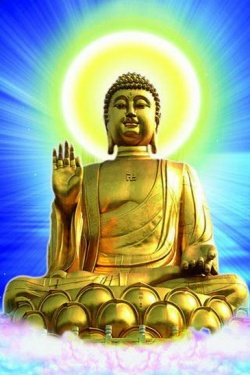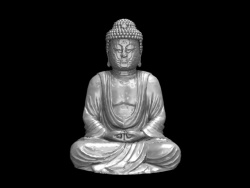Buddha & Eckhart: On Good Practices
"Any one devotional practice has things which others lack, but the effectiveness of good practices comes from God alone and is denied to none of them, for one form of goodness cannot conflict with another. Therefore people should remember that if they see or hear of a good person who is following a way which is different from theirs, then they are wrong to think that such a person's efforts are all in vain. If someone else's way of devotion does not please them, then they are ignoring the goodness in it as well as that person's good intention. This is wrong. We should see the true feeling in people's devotional practices and should not scorn the particular way that anyone follows. Not everyone can follow the same way, nor can we follow all the different ways or everyone else's way." (Davies p.29)
Eckhart's wisdom was not limited to theology, but included the practical side of the spiritual life. And, in the above quotation, he displays his wisdom with regard "devotional practice," advising people not to look down on others' practices, simply because they differ to one's own. Because Eckhart was a Christian, he advises on devotional practices rather than meditative ones, as the Buddha did, but this does not mean that this advice is useless for Buddhists, because what Eckhart has to teach is as equally applicable to the buddhist way of life as it is the Christian one. For example, when he says that "Anyone devotional practice has things that others lack," this is also true of Buddhist methods of meditation. There is anapanasati (mindfulness-of-breath-meditation), cankama (walking meditation), and metta-bhavana (cultivation of goodwill), all found in the earliest known Buddhist scriptures, the Pali Canon (or Tipitaka). Now, each meditation has different techniques and results associated with it, but they all result in goodness, promoting qualities like mindfulness and kindness. It is unhelpful and unwise for someone that practices anapanasati to criticize or belittle someone that practices metta-bhavana; there is no evidence that the Buddha did so, and surely Buddhists would be wise in following his example on this, for just as Eckhart speaks of various devotional practices coming from God, so these meditative practices came from the Buddha.
This principle can be extended, as Eckhart says, to those good people who are "following a way which is different" from our own. For, anapanasati, cankama, and metta-bhavana originate in the Pali Canon, and most Theravada Buddhists will recognize them as valid practices within their tradition. But, what of those that follow a different "way" to Theravada Buddhism? Zen buddhists practice zazen, which whilst a form of Buddhist meditation, it is not one found in the Pali Canon. Is it good for Theravada Buddhists to look down upon or criticize those that prefer zazen? On the other hand, a Zen Buddhist might frown upon Theravada Buddhists' practice as being out of date or superseded by Zen methods. Furthermore, in Shin Buddhism devotees recite the nembutsu (the mantra 'Namu Amida Butsu'), which is even further away from the Pali Canon teachings than Zen Buddhism. (Indeed, it might be argued that Shin Buddhism is more akin to the devotional practices referred to by Meister Eckhart, reflected in the rosary-based-prayers, for example.) Actually, even amongst some Theravada Buddhists the possibility of criticizing others' meditation practices might occur, as in Thailand, for instance, where there is the mantra meditation that uses the word 'Buddho" (a variation on 'Buddha'), which is not found in the Pali Canon nor its commentaries.
So, whether another Buddhist practices anapanasati, cankama, metta-bhavana, zazen, nembutsu, or any of the multitudes of esoteric practices found in Tibetan Buddhism, are we to see their disciplines as inefficacious, simply because they are different to our own? If we are wise, we will follow Eckhart's lead, and at least suspend judgement until we find out more about those practices of which we know very little. And, if we do enquire into the results of many of these meditative practices, we will find that they promote peace, kindness, compassion, wisdom, and the like, all qualities praised by the Buddha. None of them make their practitioners more violent, selfish, ignorant, or stupid. (Not if they're being practices well, that is!) As Eckhart says, "Not everyone can follow the same way," but we can be open to the possibility that other ways have good results. This principle can be extended beyond Buddhism, as well, for it seems a bit churlish to not view other spiritual practices with the same openness, given that it is not a Buddhist that has encouraged us to do it in the first place! (Of course, it may be argued that Eckhart was only addressing Christians when he wrote this advice, but given his generally positive attitude towards 'pagan' teachers, it isn't too much of a stretch to think that he would have sympathy with Buddhist meditators.) The Buddha gave us many different meditative practices, and Buddhism has developed many, many more; if they are applied wisely to our lives, it is surely the case that we will increase in wisdom and compassion. How wonderful!
"God is a God of the present. He takes you and receives you as he finds you now, not as you have been, but as you are now." (Davies p.22)
To live in the present moment is a maxim that is promoted by many these days, including sportsman, artists, psychologists, and, of course, Buddhist teachers. To be alert to the present is a teaching that goes right the way back to the Buddha himself, according to the scriptures that we posses. In the Mahasatipatthana Sutta, a seminal text on mindfulness and meditation, the Buddha says, "Furthermore, when walking, the monk discerns, 'I am walking.' When standing, he discerns, 'I am standing.' When sitting, he discerns, 'I am sitting.' When lying down, he discerns, 'I am lying down.' Or however his body is disposed, that is how he discerns it." If Gos is a God of the present, then the Buddha is a Buddha of the present, too! In their different ways, the Buddha and Eckhart encourage us to live in the present moment, not lost in reveries of the past and future. For, from such focused awareness can arise the wisdom to see beyond the limitations of the egoistic self, thereby dying into what a Buddhist would call nirvana, and Eckhart names God.
"Do you know how God is God is God? God is God because there is nothing of the creature in him. He has never been named within time. Creatures, sin and death belong to time. In a certain sense they are all related, and since the soul has fallen away from time if she has fallen away from the world, there is neither pain or suffering there. Indeed, tribulation turns to joy for her there. If we were to compare everything which ha ever been conceived of regarding delight and joy, bliss and pleasure, with the delight which belongs to this birth, then it would be as nothing." (Davies p.117)
When Eckhart refers to the creature, he is making reference to the psycho-phyisical part of us all, and when he mentions God, he is describing the unconditioned element that lies at our very heart. In nirvana, there is no identification with the creaturely part of our being; it is known and cared for, as both wisdom and compassion flow out of the void, but it is not thought of of as being 'me.' For Eckhart, God is the same, without any sense of being an individual, separated being. he is without characteristics, just like the indescribable unconditioned that the Buddha taught about. Furthermore, God is betting the reach of time, and therefore death, unlike all created, mortal creatures. nirvana is like this also; the Buddha described it as being free of birth, aging, and death, which all occur within time. The pure awareness at the heart of our being is not so limited however, for it is not creaturely in nature, and when he uses the word 'soul,' this is what Eckhart refers to, not some ethereal, floating astral being. So, according to both the Buddha and Eckhart, whether in meditative states or in enlightened ones, this awareness is also out of time, just like God.
"As far as you are in God, thus far you are in peace, and as far as you are outside God, thus far you are outside peace. If only something is in God, then it has peace. It is in peace in so far as it is in God. And you can tell how far you are in God, or not, by the extent to which you have peace or not. For where you lack peace, you must necessarily lack peace, since lack of peace comes from the creature and not from God. Nor is there anything to fear in God, for all that is in him can only be loved. Similarly there is nothing in him to cause us sadness." (Davies p.51)
Peace is emphasized by both Eckhart and the Buddha. Indeed, the latter described nirvana as peace, or at least the ultimate form of peace. Clearly, from the text above, Eckhart does not equate God with peace - although in an ultimate sense of the term, he may well do so elsewhere - but he does give peace a big importance in the spiritual life. And, this sense of peace as a fruit of spiritual practice is also used by the Buddha, who saw it as a result of being mindful and meditative. And, certainly one's progress in the noble eightfold path of the Buddha can be calculated to some extent, at least, by the amount of peace that one has in one's every day life. if we are walking around in a constant rage, wanting to hit this person or kick that person, it's a safe bet that we need to meditate or pray a little more often!
Eckhart also states that there is no fear nor sadness in God. This is also true if we have a strong level of mindfulness, which can help us to let go of such negative states of mind. This is so because as our meditation deepens we become aware of these emotions and what creates them in us - and we can then let go of them by ceasing to recreate those negative influences. Moreover, when we see beyond these limited egos, we become alive to the spacious awareness that lies beyond the sense of self, and then fear, sadness, and the like melt away into the void that shines so brightly. Such a state, whether reached through the devotional practices of a Christian contemplative like Meister Eckhart, or through a systematic Buddhist meditative life, is both peaceful and out of time. It is the serene eternity which Eckhart called God and the Buddha named nirvana.
"I never ask God to give himself to me; I beg him to purify, to empty me. If I am empty, God of his very nature is obliged to give himself to fill me." (All Eckhartian quotations taken from 'Meister Eckhart, From Whom God Hid Nothing,' edited by David O'Neal, pp.8 & 9)
When reading Eckhart from a Buddhist point of view, it's always worth reviewing what the word 'God' signifies in his writings. It does not mean some bearded anthropomorphic deity sat on a throne, nor does it indicate a kind of spiritual essence in any kind of airy-fairy way. For Eckhart, 'God' represents the personification of those positive qualities that are often merged in the word 'love.' (Echoing St. John's statement, "God is love.") The flip-side of love is wisdom, and God can indicate this, as well. Moreover, the word 'God,' at least in Eckhart's eyes, personifies the absolute, or what the Buddha called the unconditioned, nirvana. This indefinable emptiness is, in many forms of Buddhism, also encapsulated in the form of a Buddha such as Amitabha. So, when we read the word 'God' in the passages below, it is profitable to beer in mind the above, otherwise we may well get caught up in doctrinal dichotomies which neither the Buddha nor Eckhart wished us to.
Now, with the above caution in mind, on to our reflections on Meister Eckhart's teachings; he writes that he never requests of God to give himself to Eckhart, but Eckhart be emptied of himself, so that God may then 'fill' him. This means being filled with those qualities that the word 'God' signifies: love and wisdom. Eckhart states that prior to being 'filled' with God, he must be purified, or, as he then puts it, empty. According to Eckhart, if we are emptied of our own (egoistic) selves, we are filled with God; that is to say, love and wisdom fill this void, and are thereafter its expression into the world. We become selfless, wise, and loving. How wonderful! The Buddha also taught that to be emptied of any sense of self then results in both love and wisdom to arise. Usually Buddhists don't say the love, for this is associated with sexual or romantic forms of the emotion, but it can also signify compassion and kindness, both of which are lauded by the Buddha and his followers.
"How to be pure? By steadfast longing for the one good, God. How to acquire this longing? By self-denial and dislike of creatures. Self-knowledge is the way, for creatures are all nothing, they come to nothing with lamentation and bitterness. God being in himself pure good can dwell nowhere except in the pure soul. He overflows into her. Whole, he flows into her."
Buddhaghosa, the famous fifth-century commentator on the Buddha's teachings, wrote a book called the Visuddhimagga, which in English is normally rendered 'The Path of Purification.' This monumental work (and I have a translation of it, it is monumental in several definitions of that word, believe me!) describes the step-by-step progression towards enlightenment, which is derived from the teachings of the Buddha. Such detailed methodology is not found in Eckhart's work, for he came from a very different culture and tradition than Buddhaghosa, but there are parallels to be noted nonetheless. Eckhart believes that by having an intense longing for God - the personification of love, wisdom, and ultimately, 'nirvana' - we can be emptied of self and then be filled with God. This purification is done through self-denial and 'dislike of creatures.' Self-denial is a certainly found in Buddhism; it is not the free-for-all libertinism that some westerners have taken it to be in recent decades. There is a strong thread of morality and self-denial in the Buddhist Path of Purification, summed up in the five basic precepts of not killing, not stealing, not committing sexual misconduct, not lying, and not taking intoxicants. Buddhaghosa explores Buddhist morality in the Visuddhimagga, making it clear that this is the foundation of the Buddhist Way.
As to the 'dislike of creatures,' it is clear from this passage and others that Eckhart was not denying the Christian's duties towards his fellow humans (remember 'love thy neighbor'), but was specifically referring to the spiritual journey towards God. In this meditative state, the mind should not be focused on people and animals - or angels and demons, for that matter), but on God alone. This single-mindedness is capable of leading towards that emptiness that is then filled with God, probably akin to the mystical traditions found not only within the Christian tradition, but also in Sufism, Hinduism, Pure Land Buddhism, and Kabbalistic Judaism, to name but a few more. Indeed, in the two Sukhavativyuha Sutras, the Buddha instructs his disciples on how to be reborn in Amitabha Buddha's Pure land through devoted recitation of the latter Buddha's name. God, Allah, Jahweh, Krishna, Amitabha, etc. will flow into the empty mind of the devotee, and, according to Eckhart, it is all of the 'divine' that does so, not a part. This is the bliss of salvation/enlightenment.
"What does emptiness mean? It means attuning from creatures: the heart uplifted to the perfect good so that creatures are no comfort, nor is there any need of them except in that God, the perfect good, is to be grasped in them. The clear eye tolerates the mote no more than does the pure soul anything that clouds, that comes between. Creatures, as she enjoys them, are all pure, for she enjoys creatures in God and God in creatures. She is so clear she sees through herself; nor is God far to seek: she finds him in herself when in her natural purity she flows into the supernatural pure Godhead, where she is in God and God in her, and what she does, she does in God and God does it in her."
In this segment of text, Eckhart expands on what being empty means. He reiterates that no lasting comfort is to found in creatures, but adds that they do have value in that they too can be seen to be pure and full of God - unfortunately, most of them don't know it themselves, yet! This is akin to the Buddha saying that we do not gain anything through Buddhist practice, but rather empty ourselves of the fetters that prevent us from seeing our innate enlightened state: we are already enlightened, but we have yet to wake up to the fact! The purified soul 'sees through herself' and finds God within herself. Again, this is like the Buddhist that sees through his ego, discovers emptiness at his heart, and then realizes enlightenment/Buddha-nature. In this last part of the text, Eckhart uses a word that we may not be so familiar with: Godhead. This aspect of God is without form or any particulars whatsoever. It is not the personification of love, wisdom, or anything else, however laudable. It is the emptiness that lies beyond every sense of individuality, including God's. In the experience of Godhead - we may easily use the word Buddhahead also - 'she is in God and God in her.' And whatever is done by her is done by God and vice versa. This is the unity of true salvation/enlightenment, and reveals the essential union between the teachings of the Buddha and Eckhart.
"Now all thoughtful people should take note. No one is more cheerful than the one that lives in the greatest detachment." (O'Neal p.123)
The teachings of Meister Eckhart (c.1260-1327) have much in common with those of the Buddha. One subject upon which they have the greatest of convergence is that of detachment. As Eckhart says above, the detached person is the happiest, for to live without attachment is to live in true freedom. This is the heart of the Buddha's teaching, too, of course. There is a lot more to the teachings of the Buddha and Eckhart than that complete detachment that is enlightenment or salvation, of course, and in this brief essay the intent is only to touch upon such important aspects their teachings. It is hoped that the reader will find subjects in this essay for further exploration beyond these humble words, not only in the intellectual realm but also in the field of actual practice, whether grounded in Buddhism or Christianity. The focus of our study here is Meister Eckhart's own essay 'On Detachment.' It is found in David O'Neal's wonderful book 'Meister Eckhart, From Whom God Hid Nothing,' published by New Seeds Books. The page numbers after each quote refer to that book.
"The teachers praise love most highly, as Saint Paul does when he says: "In whatever tribulation I may find myself, if I have not love, I am nothing." But I praise detachment more than all love. First, because the best thing about love is that it forces me to love God. On the other hand, detachment forces God to love me. Now it is much nobler that I should force God to myself than I should force myself to God. And the reason is that God can join himself to me more closely and unite himself with me better than I could unite myself with God." (O'Neal pp.107/8)
Meister Eckhart never fails to surprise (or shock) us when we approach his words expecting typical Christian thinking. He was a complete original. Sure, he had influences such as the Neoplatonic philosopher Plotinus and Saint Augustine, but his teaching is nevertheless very much his own. The quotation above from his short booklet 'On Detachment' is a perfect example of Eckhart's originality; from the outset, he almost seems to be deliberately contradicting traditional Christian thinking when he contradicts Saint Paul and states that detachment is more important than love. What of "Faith, hope, ad love; the greatest of which is love"? (Another Pauline quote.) Meister Eckhart does this for a purpose, of course, and that purpose is not merely to shock or gain our attention, it is to highlight the importance of a detached mind in the contemplative life. In this, he is paralleling the Buddha who also extolled the centrality of detachment, exemplified by equanimity (upekkha), found in his discourses as one of the four 'sublime states' alongside goodwill, compassion, and empathy.
Equanimity is not to be understood as a kind of cool indifference to the suffering of others, but instead a calmness that sees things as they truly are, interconnected and conditioned phenomena. There is another side to detachment in the spiritual life, however, and it is this one that Eckhart refers to. This is a quality of mind that is not distracted by outer stimuli when it is engaged in absorptive meditation. This is known as samadhi in Buddhism, and is one of the three aspects of the Noble Eightfold Path that leads to enlightenment. From the viewpoint of the Buddha, Eckhart's teaching on detachment can be understood in relation to the Buddhist understanding of samadhi. By 'God,' Buddhists can understand him to mean Nirvana, especially when we read him characterizing God as a 'not-God,' or as a kind of transcendent nothingness, which he does elsewhere. When used as the focus for devotional practice, as with Christian mystics and Pure land Buddhists, for example, 'God' can also be this 'nothingness' personified, so to give something tangible to give one's love to. In this context, Eckhart's statement about loving God and being detached toward God make more sense to Buddhist sensibilities.
Eckhart shows great insight when he promotes detachment above love, revealing in Christian language what any experienced Buddhist meditator might know but cloaked in a different conceptual framework. We can see this by replacing some key terms in the above Eckhartian quote with Buddhist ones: Emptiness (Shunyata) can join itself to me more closely and unite itself with me better than I could unite myself with Emptiness. And, this is because Emptiness (God) can 'love' the practitioner or devotee more purely than the other way around, for there is nothing in Emptiness to remain separate to the latter, whereas when we try to love the object of our devotion, whether it be Jesus, Amitabha, or whoever, a trace of ego can remain, as a sense of being humble me worshipping Almighty God or Buddha. Eckhart has more to teach us about God/Emptiness and detachment in the following paragraph:
"Secondly I praise detachment more than love because love forces me to suffer all things for the sake of God, but detachment makes me receptive of nothing but God. Now it is far nobler to be receptive of nothing but God than to suffer all things for the sake of God. For in suffering man pays some attention to the creatures through which he has the suffering. On the other hand, detachment is completely free from all creatures." (O'Neal p.108)
What Eckhart seems to saying here is that it is better to merge into Emptiness first, rather than to try to love - or be compassionate towards - all creatures first. Again, he reveals his wisdom when he states that "in suffering man pays some attention to the creatures through which he has the suffering." Therefore, whatever love comes out of this creature-centered awareness will be tainted with self, whereas if we are receptive of nothing but God (i.e. Emptiness), out of this state of purity will pour true compassion for suffering creatures. Also, in the process of deepening one's knowing of God (or samadhi) all senses of other creatures and of being a creature should be left behind if the higher meditative states are to be realized. So, with Eckhart's help, we are recognizing that both the inward-looking eye and the outward looking eye benefit from putting God/Emptiness first, so that real love will follow, naturally flowing out of a freed heart, rather than forced out of a creature-focused mind.
We can see this now simply by looking backwards instead of forwards and seeing the Emptiness at our heart here and now. (Don't take my word for it, look back at where you are looking from and be completely honest about what you see.) If we recognize the Emptiness as our true being, rather than these limited and self-limiting egos, then we can see what happens when we meet people from this persecutive rather than the usual egotistic one. If 'I' die into Empty Knowing and am filled with you instead my own sense-of-self, then 'I' am really able to love you, for there is no me to get in the way. Try this in your own life, every time you meet someone, especially if there's been ill-feeling between you. What happens to that ill-feeling when you meet someone from your Emptiness rather than your ego?
"The masters also praise humility above many other virtues. But I praise detachment above all humility, and for this reason: humility can exist without detachment, but perfect detachment cannot subsist without perfect humility. For perfect humility tends to its own destruction; but detachment borders so closely on nothing that between perfect detachment and nothingness there can be nothing. Therefore perfect detachment cannot exist without humility. Now two virtues are always better than one." (O'Neal p.108/9)
Clearly, if we accept humility and detachment as qualities to be developed as part of a spiritual life, then to have both is superior to possessing only one, and this argument of Eckhart is pretty clear. But, does the Buddha encourage humility in his followers? Absolutely! Humility is the absence of such negative mental traits as conceit, arrogance, and vanity, which are all obstacles to awakening. Furthermore, humility is the non-association with the ego and all its self-delusions. In addition, the transcendence of the illusion of self is an integral part of enlightenment, with not only self-view (sakkaya-ditthi) let go of in the earlier stages of liberation, but also the much more evasive conceit (mana) relinquished at the final release from suffering. Combined with detachment, humility is a powerful mental condition needed if we wish to understand and let go of the attachment to both the notion and the feeing of being a separate, suffering self.
"I also praise detachment more than all mercy, for mercy simply means that man, going out of himself, turns to the failings of his fellow men and for this reason his heart is troubled. Detachment is free from this; it remains in itself and does not allow itself to be troubled by anything, because, as long as anything can trouble man, it is not well with him. In short, if I consider all virtues, I find none is so completely without defects and so applicable to God as is detachment." (O'Neal p.111)
What Eckhart is saying here is not that we shouldn't bother with mercy or compassion (karuna) at all, for as stated above with regard to humility and detachment, he considered two virtues superior to one; so, to have even more virtues must surely be even more advantageous to both the person displaying them and their recipients. What Eckhart is saying, however, is that mercy without detachment can be very damaging; an example of this is the so-called 'compassion fatigue' felt by many sensitive souls who observe the suffering of others in daily news reports. We can become numb to the suffering described and shown in the media; this is because compassion is coming from the ego and is therefore fundamentally limited in its capacity to take on the world's misery. If established in detachment, compassion is coming from the spaciousness of unattached awareness and therefore isn't piling too much onto the sense of self that will otherwise collapse in on itself.
"It is right that you know that to be empty of all creatures is to be full of God, and to be full of all creatures is to be empty of God. You should also know that in this immovable detachment God has dwelt eternally and he still dwells in it. And you should know that when God created heaven and earth and all creatures, that affected his immovable detachment as little as if the creatures had never been created. Indeed, I will say more: all the prayers and all the good works which man can perform in the world have as little effect on God's detachment as if neither prayers nor good works had ever been carried out." (O'Neal p.113)
This is one of those statements by Meister Eckhart that can leave us dumbfounded at his apparent arrogance: he appears to reject the long-established Christian practices of petitionary prayers performed to gain some advantage for either those praying or others or both. He seems to be claiming that such prayers do not even reach God, let alone get answered by him! It's as if every email that we send never reaches its addressee - what a horrid state of affairs! In fact, if we refer back to how Christ taught his followers to pray (i.e. The Lord's Prayer), Eckhart's vision of prayer is actually more orthodox than the widely-enacted petitionary prayers. This kind of praying is actually an acceptance of what is as the will of God, rather than petitionary praying which wishes to change current conditions. Eckhart calls this "the prayer of detachment:"
"But now I ask: What is the prayer of the detached heart? I answer that detachment and purity cannot pray. For if anyone prays, he asks that something be given him, or asks that God may take something away from him. But the detached heart does not ask for anything at all, nor has it anything at all that it would like to be rid of. Therefore it is free of all prayer, and its prayer is nothing else than to be uniform with God. On this alone the prayer of detachment rests." (O'Neal p.120)
As to good works, which Eckhart denies reach God's attention either, Buddhism is full of them: making offerings of food, money, medicine, shelter, clothing etc. to monks and nuns; charity for the poor and ill; and every day acts of kindness that make other peoples' lives that little bit more bearable. Is Eckhart saying that these are nothing to God? Apparently. But, he is not rejecting them completely, for just as in Buddhist teaching, good works have good results for Christians, too. But, Eckhart is talking of the meditative life here, and he wishes to help us go beyond ego-based good acts as well as ego-based prayers: and it is in detachment that he believes we may do so. If we can establish ourselves in detachment, then our prayers and our good works come from the spaciousness of non-attachment. They will not only be of more advantage to our spiritual development, but will also benefit others more completely because they have not been diluted by our inherently (but not always obviously) self-centered egos.
The detached heart, according to Eckhart, has "nothing at all that it would be like to be rid of." This a pure state of mind, for sure. if we examine our everyday minds for just a few moments, we will become aware not only of the outer worldly conditions (and people) that we'd like to see the back of, but also many, many elements within our own minds that are equally undesirable. Eckhart does not talk of some holy battle between good and evil, or God and Satan, here, however. He sees "the prayer of detachment" as the means to let go of all defiling aspects of our psyches that will open us up "to be uniform with God." In the final quotation at the end of this essay, Eckhart actually states that ultimate detachment is God, so if we are "uniform" with God, this seems to indicate merging with God as God, with no hint of separation existing. This sounds uncannily like some descriptions of Nirvana as being beyond all opposites and any sense of a separate, suffering self. This is the goal of meditative practice, however, and to achieve this we will benefit from further guidance, which Eckhart readily gives us:
"Now you should know that that a religious man that loves God uses the powers of the soul in the outward man no further than what the five senses require as a matter of necessity. And the inward man does not heed the five senses, except insofar as he is their guide and leader." (O'Neal p.116/7)
Here, Eckhart is touching upon what the Buddha called the aggregates (khandha). The big difference is that the Buddha included the mind as one of the six senses, for if there were no mind, there would be no consciousness of the other five senses. This difference between the Buddha's teaching and Eckhart's may well be down to the religious traditions from which they came; sixth-century B.C. Indian religion was much more psychological in focus than medieval Christian theology. Despite this difference, Eckhart is still teaching us to behave in ways that the Buddha also previously promoted. They both taught that we should look after our bodies, indeed, to realize enlightenment, we need strong bodies that can support our meditation, as shown in the Buddha's own acceptance of sustenance from a young woman prior to achieving full awakening. Eckhart is clearly encouraging us to do the same, but no more. To indulge in the senses is a no-no for him, just as it was for the Buddha, who encouraged monks and nuns to lower their gaze when traveling around, so not to become too caught up in the world around them.
"[Hence,] if the heart is to find preparedness for the highest of all flights, it must aim at a pure nothing, and in this there is greatest possibility that can exist. For when the detached heart has the highest aim, it must be toward the Nothing, because in this there is the greatest receptivity." (O'Neal p.119)
The detached heart (or mind) is able to realize "the Nothing" that opens us up to enlightenment. This "pure nothing" is a clear awareness free of any attachments to worldly objects, whether physical or psychological in form. As written above, this detached state is what the Buddha described as samadhi, and is a profound meditative absorption that cancels out any attachment to or identification with the world. Eckhatr's language may seem somewhat vague, as well as poetical, and whilst the Buddha is credited with producing much verse, he also produced much well-organized prose. Some of this latter literary style of the Buddha features another important Buddhist teaching related closely to detachment which is often translated as 'seclusion' or even 'detachment,' and is known in the original Pali as viveka. In the commentaries to the Buddha's actual teachings on viveka, this important concept is divided into a threefold system:
1. kaya-viveka: bodily-detachment
2. citta-viveka: mental detachment
3. upadhi-viveka: detachment from the roots of suffering
Eckhart certainly promotes the first kind of detachment, the seclusion form the world in its most distracting forms. As to the second kind of viveka, it is clear that he also taught of detached states that were free of mental distractions, too. And, as for the roots of suffering, greed, hatred, and delusion, these three states no longer exist when we are in the deepest of samadhis or meditative prayer. True enough, these are temporary states, for as soon as we come out of them we are back in the world of suffering, but they are a glimpse of full enlightenment which is the complete and permanent transcendence of the three causes of suffering, which is the ultimate goal of Buddhism. And, from reading Eckhart, it can also be the goal of the Christian life, too. For, as is revealed in the final quotation below, Eckhart recognized God, which Buddhists call nirvana, to be the ultimate detachment of all:
"It purifies the soul, cleanses the conscience, inflames the heart, arouses the spirit, quickens desire, and makes God known. It separates off the creatures and unites the soul with God. Now take note, all thoughtful creatures: the swiftest animal that bears you to perfection is suffering, for no one will enjoy more eternal bliss than those who stand with Christ in the greatest bitterness. Suffering is bitter as gall, but to have suffered is honey-sweet. Nothing disfigures the body before men so much as suffering, and yet nothing beautifies the soul before God so much as to have suffered. The surest foundation on which this perfection can rest is humility. For while the natural man crawls here in the deepest lowliness, his spirit flies up into the heights of the Godhead, for joy brings sorrow and sorrow brings joy. If anyone wishes to attain perfect detachment, let him strife for perfect humility, then he will come close to the Godhead. May the highest detachment, that is, God himself, assist us to achieve this. Amen." (O'Neal p.123/4)
“The eye with which I see God is the very eye with which God sees me”
(Meister Eckhart)
Meister Eckhart (1206-1327) is one of the greatest and most original of Europe’s mystics, quoted by influential figures like Pope John Paul II and the Fourteenth Dalia Lama. Probably born Johannes Eckhart in Thuringia in medieval Germany, he held many high positions within the Roman Catholic Church, and was an extremely popular preacher and teacher to countless devout Christians. In his teachings, however, he did not always keep to orthodox interpretations of scripture and dogma, sometimes sounding exceedingly doctrinally unsound. Indeed, such statements resulted in Eckhart being charged with heresy, and posthumously being found guilty on several counts. From the perspective of Buddhism, it is the more controversial declarations of the master that interest us, for it is in such statements as the one quoted above that Eckhart and Buddha seem in profound agreement.
In the following extracts from Eckhart’s writings, we will travel with him into what he likes to call the Godhead, the indescribable depths even less imaginable than that of God, which according to the master is being itself. In our exploration of Eckhart’s musings on God, Godhead, and being, we will be accompanied by the great exponent of Japanese Buddhism Daisetz Teitaro Suzuki. Suzuki, most famous for introducing the West to Zen Buddhism, gives us a somewhat different take on Eckhart’s insights which enable us to relate them more readily to the Buddha and his teachings. It is worth noting from the outset that both the Eckhartian understanding of God and the Zen experience of the Buddha as described in this article do not refer to the exalted individuals normally indicated by those titles, but instead indicates a genderless, incorporeal non-thing which lies at the heart of existence. Read Eckhart on this:
“Being is God…God and being are the same – or God has being from another and thus himself is not God…Everything that is has the fact of its being through being and from being. Therefore, if being is something different from God, a thing has its being from something other than God. Besides, there is nothing prior to being because that which confers being creates and is a creator. To create is to give being out of nothing” (Meister Eckhart)
Eckhart has a radical understanding of God compared to almost every other Christian one might meet or read. Even more than other giants of Christian mysticism and theology, his view of God is far removed from the conventional belief in an anthropomorphic deity sat on high. His God does not possess a flowing white beard and matching locks, nor does He perch on a celestial throne, barking orders at humanity and sending the odd plague or two to punish us. The Eckhartian version of God is being itself, the very “is-ness” of life (see the following quote below). Furthermore, He resides as the very being of each and every one of us, whether we profess the Christian faith, the Buddhist one, or another, or no faith at all. God is the origin of all, and at the fundamental level of existence He is us and we are he. What your average born-again or bishop would make of this description of God only, well, God knows!
In the above quotation, Eckhart argues that because Christians conceive of God as the Creator of all things, He must be in all things as their very being. If the essential being of an entity is not God, then it is not being either, and therefore some other quiddity must be the essence of all life, including what we deem ‘God.’ This argument is a kind of self-perpetuating loop, which can be easily criticized by any half-decent philosopher, but it isn’t the central point here. What’s important to recognize in Eckhart’s thinking is where he is coming from, rather than the efficacy of his theology. This is a consideration emphasized by the Japanese Zen Buddhist writer D.T. Suzuki, who was extremely keen on Meister Eckhart. He makes this point in the following observation:
“Mere thinking or logical reasoning will never succeed in clearing up problems of deep religious significance. Eckhart’s experiences are deeply, basically, abundantly rooted in God as being which is at once being and not-being: he sees in the ‘meanest’ thing among God’s creatures all the glories of his is-ness (isticheit). The Buddhist enlightenment is nothing more than this experience of is-ness or suchness (tathata), which in itself has all the possible values (guna) we humans can conceive.” (D.T. Suzuki)
The erudite Suzuki recognized that Eckhart’s vision was not an intellectual or philosophical one, but grounded in the German mystic’s actual experiences. God, for Eckhart, is not a belief; He is known at the very core of being, as the “is-ness” of life. Suzuki goes a little further, as we might expect of someone so deeply immersed in the wisdom of Zen, and states that the being that is God is “At once being and not-being.” This echoes another of Eckhart’s bold statements when he announced that “God is a not-God.” This tendency amongst Buddhists and Eckhart to use apparently contradictive ideas to describe the Indescribable is a kind of safety device so that we might avoid turning the Ineffable into a mere concept or belief. For, whilst we might say with some justification that God, or Buddha for that matter, is the being of us all, if we cling to such an idea as absolute truth, the real Truth has slipped through our grasp. Of this real Truth, Eckhart says:
“God’s characteristic is being…The most trivial thing perceived in God, a flower for example espied in God, would be a thing more perfect than the universe. The vilest thing present in God as being is better than angelic knowledge.” (Meister Eckhart)
Usually, when we perceive the universe from the perspective of a limited, individual, separate ego, we don’t see the big picture. Instead, we view life through the distorted lens of self, sometimes seeing the most beautiful of things with an embittered mind. By contrast, Eckhart argues that if we experience something “perceived in God,” that is to say from the viewpoint of pure awareness or being, then we know it as it is rather than as we might take it to be with our egoistic, dualistic notions. This pure awareness is God to Eckhart and Buddha to a Zen Buddhist like D.T. Suzuki (and to me!). Again, it is important to remember that this understanding of God and Buddha does not refer to separate beings but being itself, which is” without image,” as Eckhart explains below:
“You should know Him without image, without semblance and without means. – ‘But for me to know God thus, with nothing in between, I must be all but He, He all but me.’ – I say, God must be very I, I very God, so consummately one that this He and this I are one ‘is,’ in this is-ness working one work eternally; but so long as this He and this I, to wit, God and the soul, are not one single here, one single now, the I cannot work with nor be one with that He.” (Meister Eckhart)
It is clear from reading these passages that Eckhart sees the point of the spiritual life as a kind of union or submerging into ‘God.’ Mainstream Christianity would have nothing to do with this, considering such statements as “God must be very I, I very God, so consummately that this He and this I are one ‘is’” as heresy. For most Christians, Eckhartian mysticism is light years away from their ideas of resurrection and eternal – but separate – life with God, either in heaven or on a New Earth. In contrast to this, Eckhart surely seems closer to the Buddha’s teachings regarding transcending all dichotomies and realizing Nirvana right here and now. And, if there was any doubt as to the depth of union between God and the I in previous quotes from the master above, let’s examine one more:
“God’s is-ness is my is-ness, and neither more nor less. The just live eternally with God, on a par with God, neither deeper nor higher. All their work is done by God and God’s by them.” (Meister Eckhart)
According to Eckhart, not only are we unified with God at the level of ‘is-ness,’ but we become one with Him. What’s more, my is-ness is as great as God’s; how’s that for heretical assertion? (And yet, remember that at the top of this article it was mentioned that Pope John Paul II, not exactly an original theologian, actually quoted Eckhart on occasion. Presumably, it wasn’t one of the sayings we’re scrutinizing here!) Interestingly, we could change some of the terminology from Christian to Buddhist and it still works: Buddha’s is-ness is my is-ness, and neither more nor less. Or, recalling the quote at the top of this article: The eye with which I see Buddha is the same eye with which Buddha sees me. Despite these strong parallels, some Buddhists may still object that Eckhart’s God does not equate to the Buddha; but what of his understanding of Godhead?
“God and Godhead are as different as earth is from heaven. Moreover I declare: the outward and the inward man are as different, too, as earth and heaven. God is higher, many thousand miles. Yet God comes and goes. But to resume my argument: God enjoys Himself in all things. The sun sheds its light upon all creatures, and anything it sheds its beams upon absorbs them, yet it loses nothing of its brightness.” (Meister Eckhart)
God is the active, alive aspect of being in us and all things. Godhead, on the other hand, is pure No-thing, not even manifest in us as the empty heart of our being. As Eckhart intimates elsewhere, Godhead is only experienced – if that’s the right word – in deep states of prayer akin to Buddhist meditation, which correlates to the experience of complete Nirvana with the absence of outer sense data. God isn’t so evasive, and “comes and goes,” and, “enjoys Himself in all things.” This sounds like the active side of Nirvana, that is to say the awareness of Buddha Nature in the midst of the world, as opposed to only in rapt meditation. To clarify Eckhart’s distinction between God and Godhead, let’s read more of D.T. Suzuki’s analysis of Eckhartian mysticism:
“God comes and goes, he works, he is active, he becomes all the time, but Godhead remains immovable, imperturbable, inaccessible. The difference between God and Godhead is that between heaven and earth and yet Godhead cannot be himself without going out of himself, that is, he is he because he is not he. This ‘contradiction is comprehended only by the inner man, and not by the outer man, because the latter sees the world through the senses and intellect and consequently fails to experience the profound depths of Godhead.” (D.T. Suzuki)
The inner and outer man, as Suzuki establishes, are different because of the direction of their attention: the outer man gazes outward into the world of things (including himself), while the inner man dares to peer inwards beyond even his own mind into the depths that lie beyond all things. This is achieved through dedicated and focused attention that never wavers in its search for the ‘is-ness’ of existence. Once recognized and then let go of, this is-ness reveals its ultimate nature as nothingness, or the No-thing. All things and processes cease in the deep void of Godhead/Buddhahead. Coming out of this state, the world is experienced in relation to its is-ness or suchness (tathata). This suchness is where the Buddhist designation Tathagata (‘Thus-Come One’) comes from. To be enlightened, whether as a Buddhist or an Eckhartian, is to live in awareness of the is-ness that we come from. This is freedom from suffering, liberation from the ego-delusion, and ultimate happiness.


















